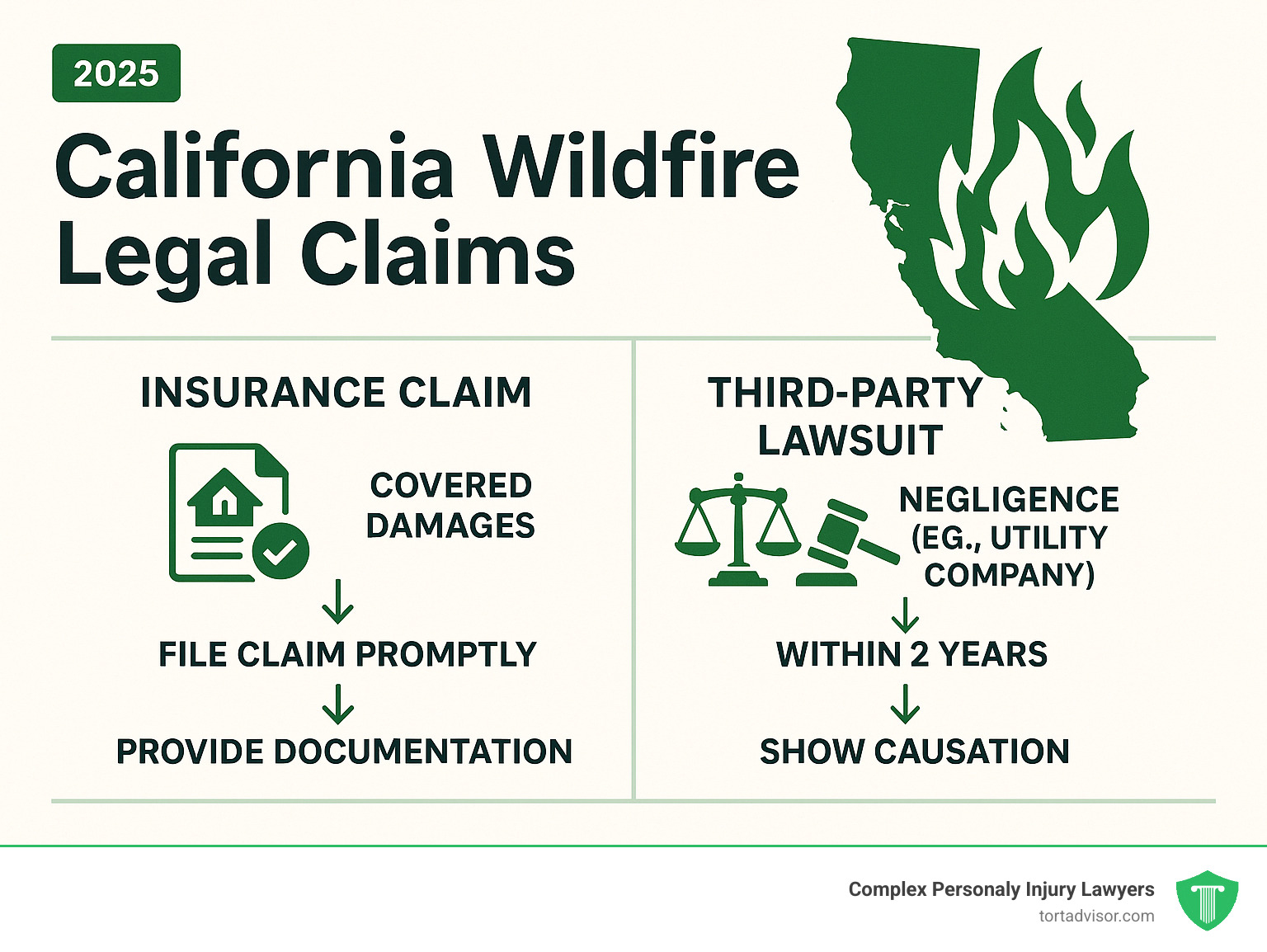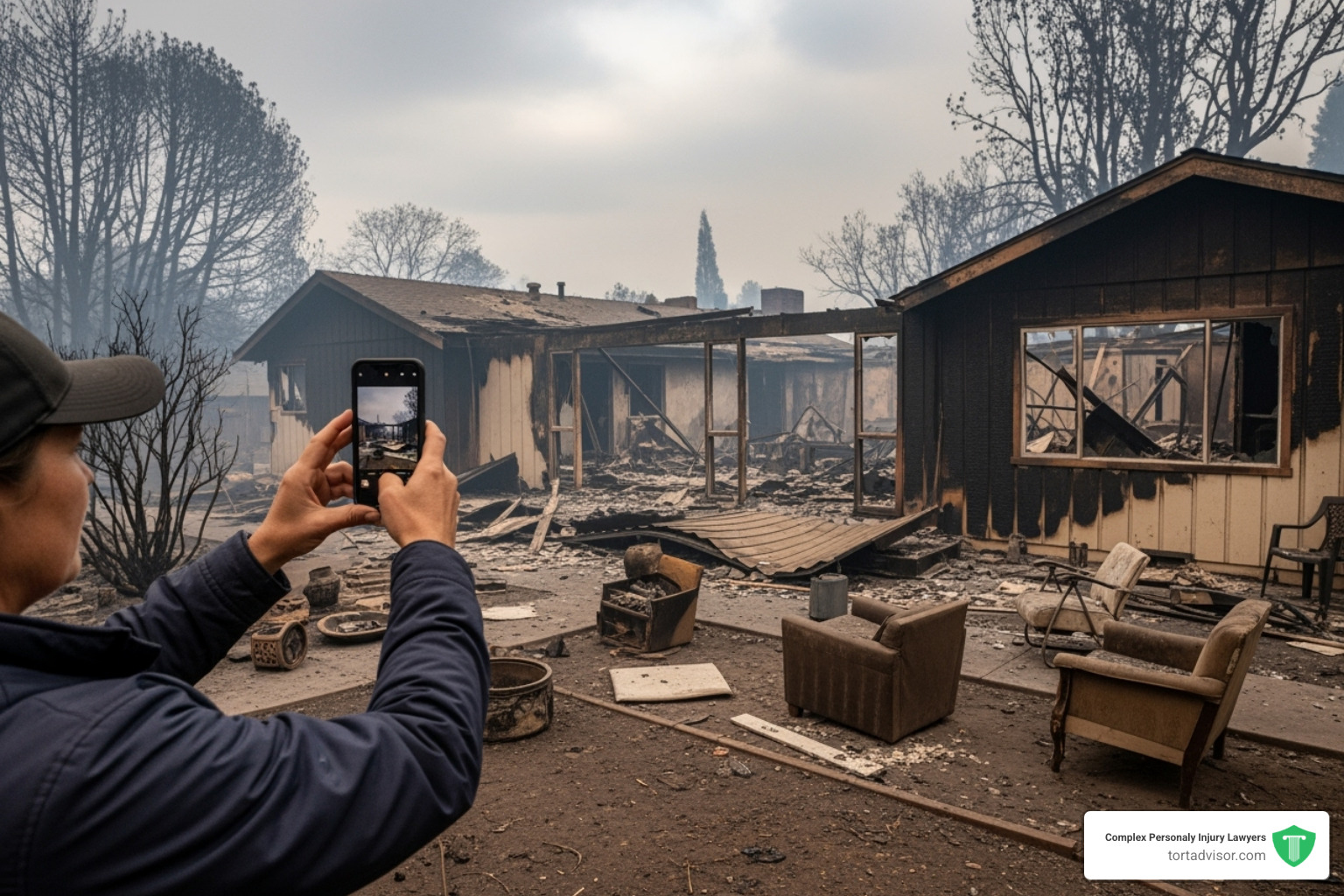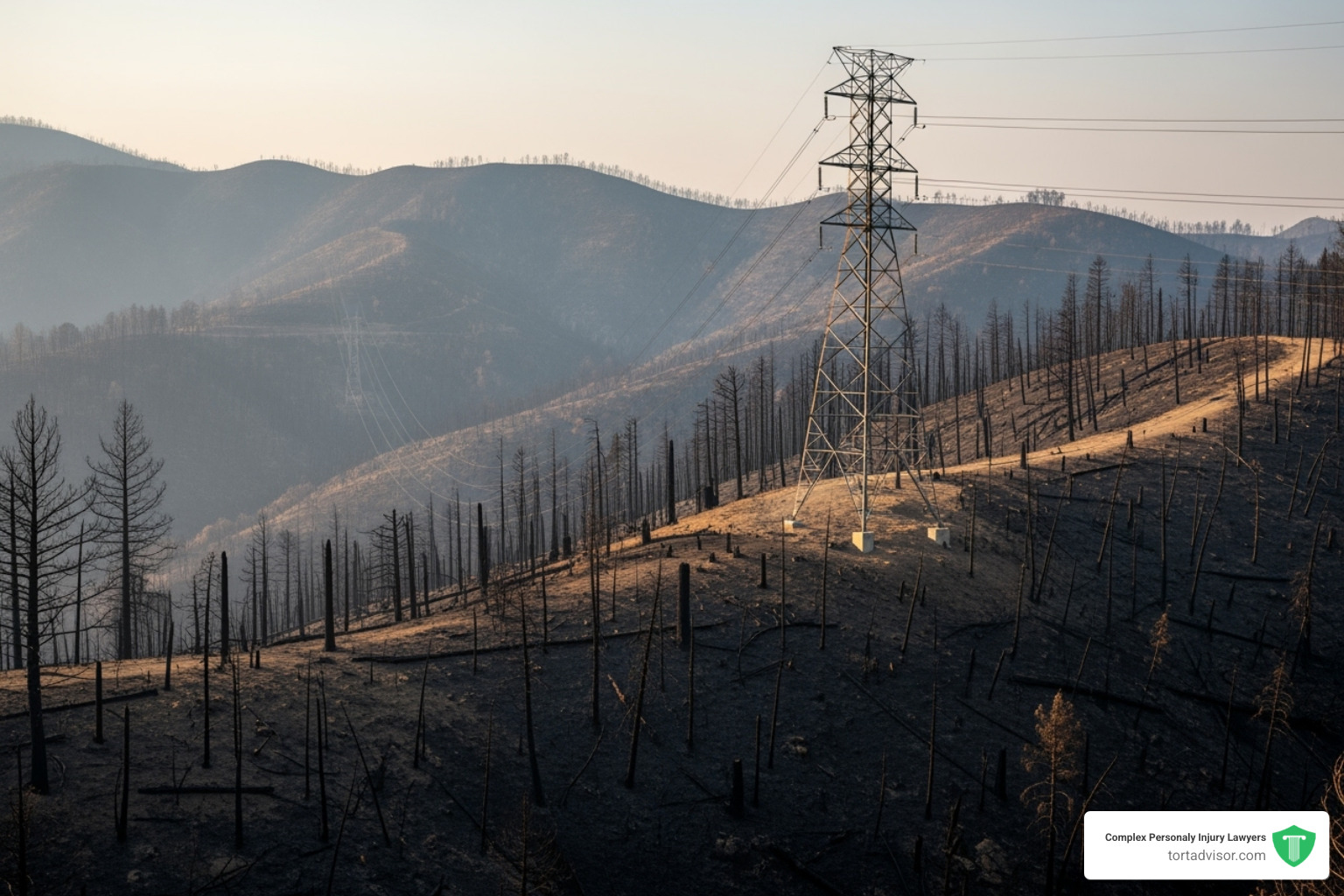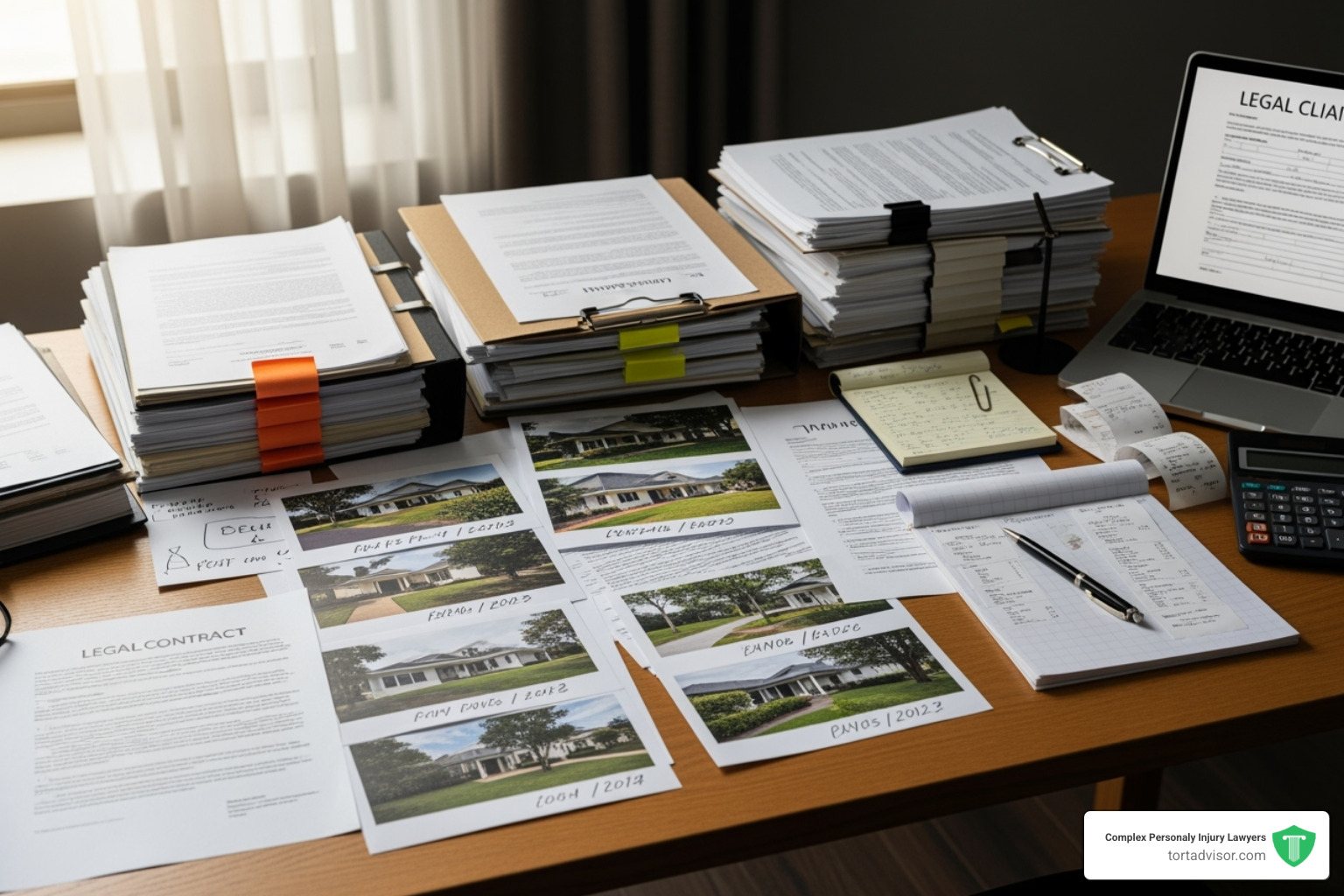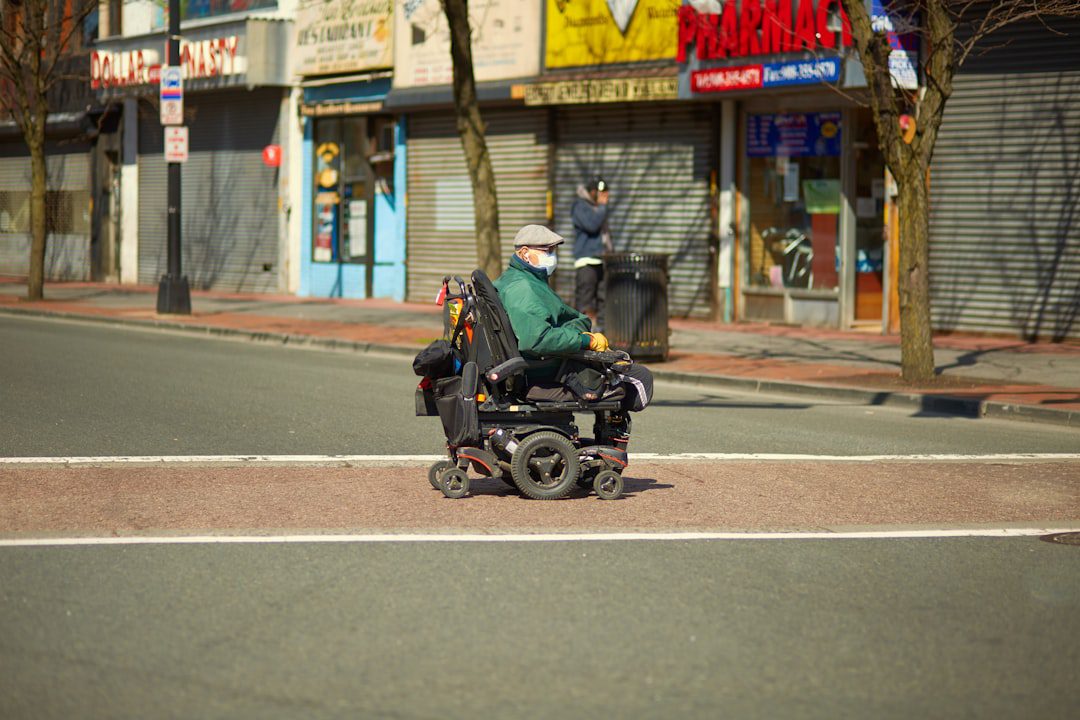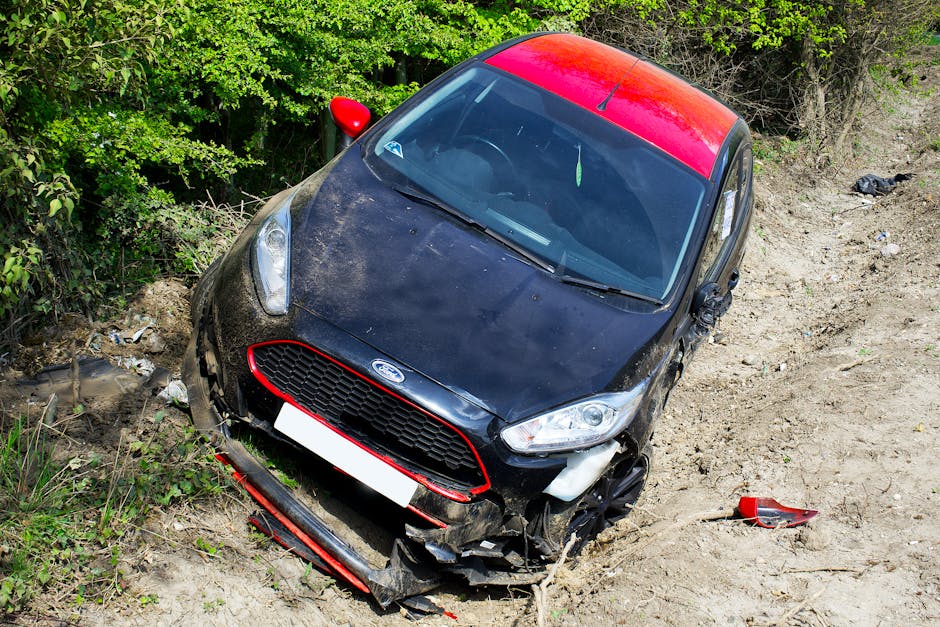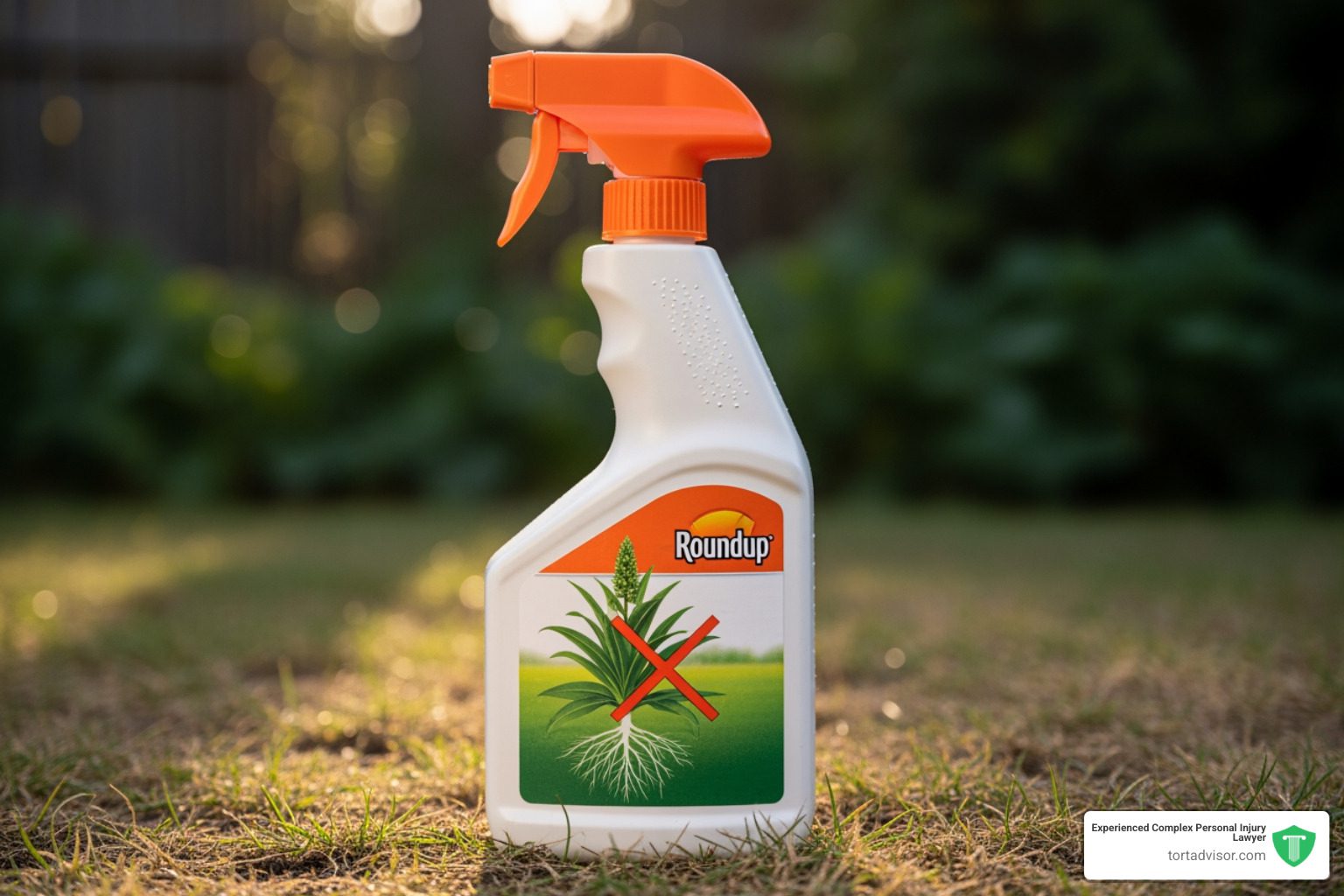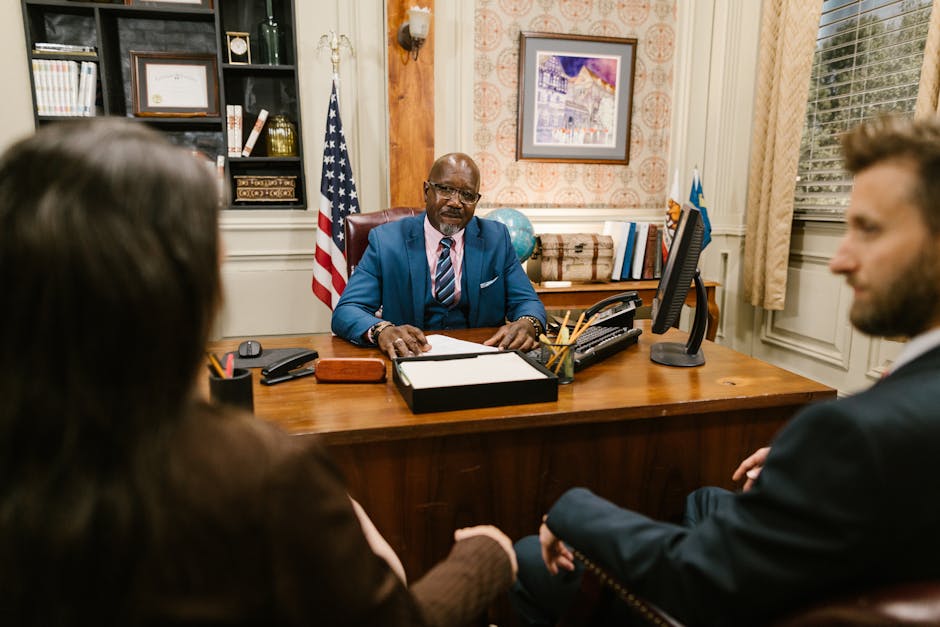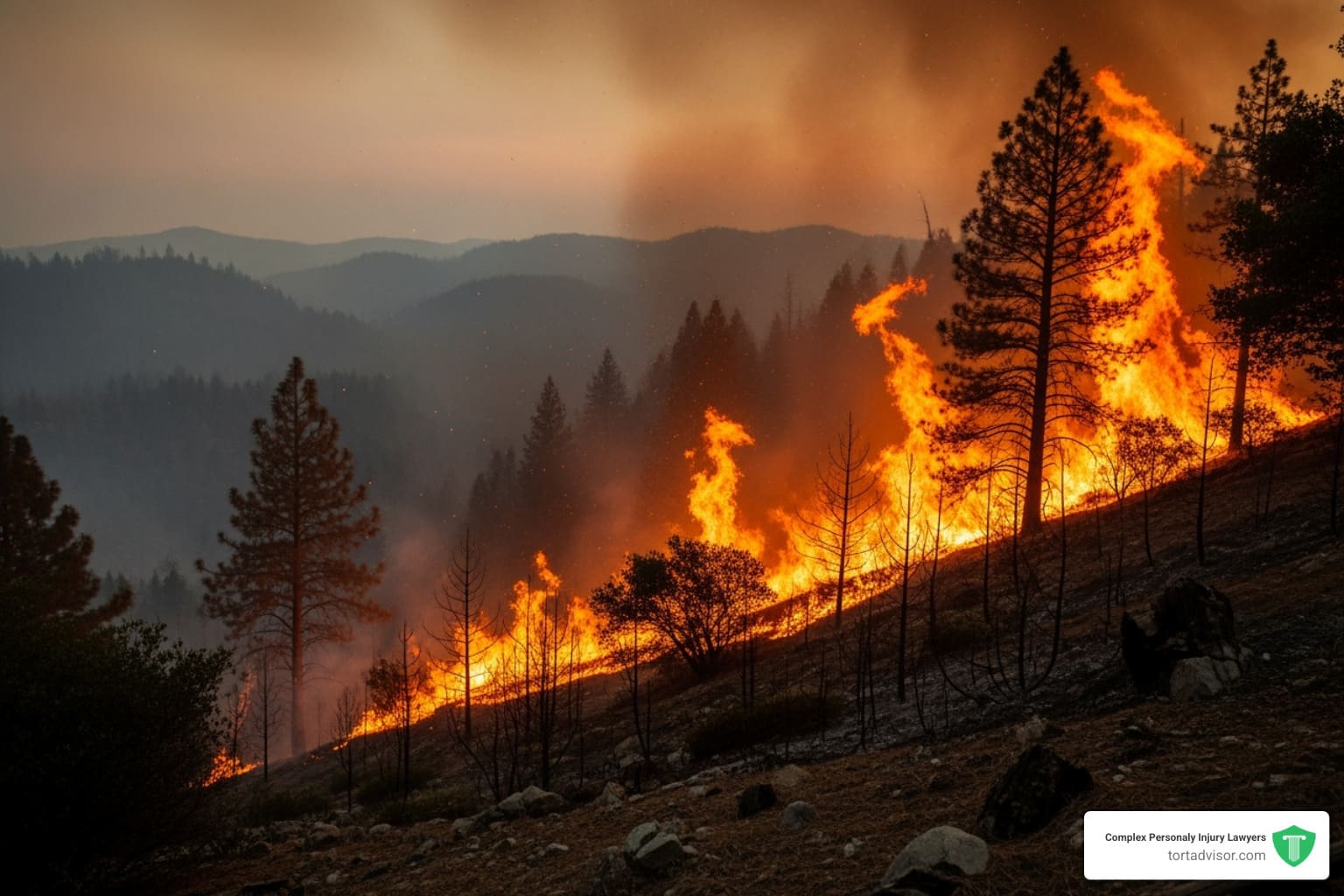


Understanding Your Rights After California’s Devastating Wildfires
California wildfire legal claims offer victims multiple paths to compensation after these devastating disasters. When wildfires destroy homes and businesses, victims can pursue:
- Insurance claims for covered property damage and living expenses
- Third-party lawsuits against utility companies or other negligent parties
- Bad faith claims if insurers wrongfully deny or underpay legitimate claims
- Government assistance programs for additional support
California has experienced some of the most devastating wildfires in history. The catastrophic Camp Fire resulted in at least 81 deaths and destroyed over 17,000 homes and buildings. In 2020, Pacific Gas & Electric agreed to pay $13.5 billion in damages to victims of wildfires caused by its equipment in 2017 and 2018.
The legal landscape is complex. Insurers may deny claims or offer settlements far below actual losses. Utility companies often fight liability despite evidence their equipment caused fires, and many victims find their insurance coverage falls short of rebuilding costs.
Fortunately, California law provides strong protections for wildfire victims. You have the right to fair treatment from your insurance company and can sue negligent parties who caused the fire. Specialized attorneys can help you steer this complex process at no upfront cost.
California wildfire legal claims definitions:
- California wildfire litigation lawyer (https://tortadvisor.com/california-wildfire-litigation-lawyer/)
- California wildfire wrongful death (https://tortadvisor.com/california-wildfire-wrongful-death/)
First Steps After a Wildfire: Protecting Your Rights and Claim
The actions you take in the first hours and days after a wildfire can make or break your california wildfire legal claims. Here are the critical first steps:
- Contact your insurer immediately to report your claim. Prompt notification is often required and can speed up your recovery.
- Document everything before cleaning up. Take extensive photos and videos of all damage, including subtle signs like soot, heat damage, or warped siding. Wildfire heat can cause hidden damage to foundations, HVAC systems, and structural elements.
- Keep every receipt. Expenses for temporary housing, clothing, and securing your property may be reimbursable under your policy’s Additional Living Expenses coverage, but you’ll need proof of payment.
- Create a detailed inventory of lost belongings. List everything you can remember, including furniture, electronics, and personal items, with descriptions and approximate values. Old photos can help jog your memory.
- Secure your property from further damage. Once it’s safe, board up windows or cover damaged roofs. Insurers expect you to take reasonable steps to prevent additional loss.
The California Department of Insurance offers a helpful guide to expedite your claim (https://www.insurance.ca.gov/01-consumers/105-type/95-guides/03-res/upload/IG-Residential-Property-Claims-Guide-Updated-091423.pdf). If you’re considering legal action, you can learn more about wildfire lawsuits (https://tortadvisor.com/tort/wildfire-lawsuit/) to understand your options.
What to Do if You’re a Renter or Uninsured
Even if you don’t own your home or have insurance, you still have rights and potential paths to recovery.
Renters with renter’s insurance can file a claim for personal belongings. While your landlord’s policy covers the building, your policy protects your possessions. Document your losses thoroughly and file your claim promptly.
Uninsured victims can still sue the party responsible for starting the fire. California law allows all wildfire victims to pursue compensation from negligent utilities or other at-fault parties.
Federal and state assistance programs like those from FEMA and the Small Business Administration offer grants and low-interest loans to disaster victims, regardless of insurance status. These can provide crucial support while you pursue other compensation.
Navigating Your Insurance Policy and Rights
Dealing with insurance companies after a wildfire can be challenging, but California law provides strong protections for policyholders.
California law requires insurers to act in good faith, meaning they have a legal duty to process your claim promptly, investigate it thoroughly, and offer a fair settlement. You have a right to fair and prompt treatment.
One of the most critical parts of your policy is Additional Living Expenses (ALE) coverage. ALE covers increased costs like temporary housing and food if your home is uninhabitable. California law ensures ALE coverage extends for at least 24 months, and up to 36 months if rebuilding is delayed by circumstances beyond your control. This protection is vital when rebuilding takes longer than expected. You can learn more about these consumer protections here: https://www.insurance.ca.gov/01-consumers/130-laws-regs-hearings/05-CCR/fair-claims-regs.cfm. For details on ALE, visit: https://www.insurance.ca.gov/01-consumers/105-type/95-guides/03-res/res-prop-claim.cfm.
Common Reasons for Denied or Underpaid Claims
Despite laws requiring good faith, insurers sometimes deny or underpay california wildfire legal claims. Understanding common tactics can help you fight back:
- Underinsurance: Many find their policy limits are too low to cover today’s high rebuilding costs.
- Policy Exclusions: Policies often exclude or limit coverage for things like landscaping, offering to replace mature trees with small seedlings.
- Inadequate Documentation: Insurers may use a lack of detailed documentation of your losses as a reason to dispute your claim’s value.
- Disputes Over Repair Costs: Insurers often provide low repair estimates or argue over the quality of replacement materials.
Learn about policy exclusions here: https://www.insurance.ca.gov/0250-insurers/0500-legal-info/0200-regulations/cic100-124.cfm.
What Is Insurance ‘Bad Faith’?
When an insurer fails to treat you fairly, it may be acting in “bad faith”—a serious legal violation. Signs of bad faith include:
- Unreasonable Delays: Intentionally dragging out the claims process to pressure you into accepting a lower settlement.
- Inadequate Investigation: Conducting a superficial investigation that ignores crucial evidence.
- Misrepresenting Policy Provisions: Deliberately misleading you about what your policy covers to justify a denial.
- Lowball Settlement Offers: Offering a settlement that is clearly unreasonable and doesn’t reflect the true value of your loss.
Recognizing these signs is crucial, as a bad faith claim can lead to compensation beyond your policy limits. Learn more about related personal injury lawsuits: https://tortadvisor.com/personal-injury-lawsuits/.
California’s Timelines for Settling a Claim
California enforces its good faith requirement with strict timelines for california wildfire legal claims:
- Acknowledge Claim: Insurers must acknowledge your claim within 15 calendar days.
- Accept or Deny: They have 40 calendar days to accept or deny your claim after you submit proof of loss.
- Payment: Once a settlement is reached, payment must be made within 30 calendar days.
If an insurer misses these deadlines without a valid reason, it can be evidence of bad faith. The California Department of Insurance provides detailed guidance: https://www.insurance.ca.gov/0200-industry/0050-renew-license/0200-requirements/upload/Guide-for-Adjusting-Property-Claims-in-California-After-a-Major-Disaster-2.pdf.
Pursuing California Wildfire Legal Claims Against Liable Parties
When insurance doesn’t cover all your losses, you have the right to pursue california wildfire legal claims against negligent parties responsible for the fire. This allows you to seek compensation for the full scope of your damages and hold at-fault companies accountable.
Utility companies are frequent defendants. Electrical infrastructure from companies like Pacific Gas & Electric (PG&E) and Southern California Edison (SCE) has ignited many of California’s most destructive wildfires. These fires often stem from poorly maintained equipment or failure to de-energize power lines during high-risk conditions. PG&E’s $13.5 billion settlement for the 2017 and 2018 wildfires highlights the scale of utility liability.
Government entities can also be held liable if their negligence contributed to a fire’s spread, such as failures in water supply during firefighting efforts. Homeowners, renters, business owners, and anyone who suffered injury or emotional distress from the fire may have grounds for a lawsuit.
You can learn more about different types of wildfire lawsuits here: https://tortadvisor.com/tort-category/wildfire-lawsuits/.
What Damages Can Be Recovered in California Wildfire Legal Claims?
Lawsuits aim to make you “whole” again by covering a wide range of damages beyond what insurance typically pays for:
- Property Damage: The full cost to rebuild or repair your home and other structures, plus any diminution in property value.
- Personal Belongings: The replacement value of all destroyed possessions, from furniture to family heirlooms.
- Economic Losses: Lost wages, loss of business income, and evacuation costs like temporary housing and food.
- General Damages: Compensation for non-economic harm like emotional distress, pain and suffering, and loss of enjoyment of life.
- Landscaping Losses: The true replacement value of mature trees, which can range from $5,000 to $50,000 per tree, plus costs for erosion control.
- Wrongful Death Claims: For families who lost a loved one, this covers funeral costs, lost financial support, and compensation for emotional suffering. Learn more here: https://tortadvisor.com/california-wildfire-wrongful-death/.
Understanding Strict Liability and the Role of the CPUC
California law includes strict liability, a powerful legal concept for wildfire victims. Under strict liability, if a utility’s equipment causes a wildfire, they can be held responsible for damages even if you can’t prove they were negligent. You only need to show their equipment started the fire and you suffered damages.
The California Public Utilities Commission (CPUC), which regulates utilities, plays a key role. CPUC investigations into wildfire causes often provide crucial evidence for lawsuits. Their findings on safety violations can strengthen victim compensation claims. You can explore the CPUC’s work here: https://www.cpuc.ca.gov/.
Building Your Case: Evidence, Deadlines, and Legal Help
After a wildfire, you may wonder when to seek legal help. You should contact an attorney early if your claim involves substantial losses, has been denied, or feels too complex to handle alone. Early legal guidance can protect your rights from the start.
Complex Personal Injury Lawyers at Tort Advisor connect you with attorneys specializing in california wildfire legal claims. They work on a contingency fee basis, meaning you pay no attorney fees unless they recover compensation for you. This removes the financial barrier to getting the expert help you need. An attorney can evaluate your insurance coverage, investigate utility negligence, and pursue bad faith claims against insurers.
Evidence Needed to Prove Your Claim
Strong evidence is the foundation of your claim. The more documentation you have, the stronger your case will be.
- Visual Documentation: Take photos and videos of all damage before any cleanup. Capture wide shots for scope and close-ups for detail. This is invaluable for showing the full extent of your loss.
- Financial Records: Keep every receipt for repairs, temporary housing, meals, and other displacement-related expenses. Also, save all correspondence with your insurance company, including emails and notes from phone calls.
- Professional Assessments: Reports from structural engineers, arborists, or public adjusters provide independent, expert opinions that can counter low settlement offers. Medical records are essential if you suffered physical injuries.
Understanding the Statute of Limitations for California Wildfire Legal Claims
Legal deadlines, or statutes of limitations, are strict and can bar your right to compensation if missed. For california wildfire legal claims, the time limits vary:
- Personal Injury & Wrongful Death: Two years from the date of the incident.
- Property Damage: Three years from when the damage occurred.
- Claims Against Government Entities: Much shorter deadlines, often just six months.
These deadlines can be complex, as the clock may start when the damage is finded, not when the fire occurred. Missing a deadline can eliminate your right to sue. An experienced attorney will ensure all claims are filed on time. Find more information on California’s statute of limitations here: https://selfhelp.courts.ca.gov/civil-lawsuit/statute-limitations.
Frequently Asked Questions about California Wildfire Claims
After a wildfire, you likely have many questions. Here are answers to some of the most common concerns from survivors.
Can I sue my insurance company for bad faith after a wildfire?
Yes. If your insurer unreasonably denies your claim, delays payment, or makes a lowball offer for your california wildfire legal claims, you can sue them. You can file a breach of contract claim for failing to honor your policy and a bad faith tort claim for violating their duty to treat you fairly. A successful bad faith lawsuit can result in compensation beyond your policy limits, including damages for emotional distress and, in some cases, punitive damages to punish the insurer.
What are the costs of hiring a wildfire attorney?
Complex Personal Injury Lawyers at Tort Advisor work on a contingency fee basis. This means you pay nothing upfront. Your attorney’s fee is a percentage of the settlement or verdict they secure for you. If they don’t win your case, you owe no attorney fees. This arrangement aligns your attorney’s interests with yours, as they are motivated to achieve the maximum possible recovery.
What resources are available from the state for wildfire survivors?
California provides several key resources to help survivors.
- The California Department of Insurance (CDI) offers a dedicated wildfire resource center with information on filing claims and understanding your rights. Their consumer hotline can also help with insurer disputes. Access their resources here: https://www.insurance.ca.gov/01-consumers/140-catastrophes/WildfireResources.cfm.
- The California Governor’s Office of Emergency Services (CalOES) provides guidance on debris removal, financial aid, and other recovery support. Their website is an excellent starting point for finding federal and state assistance. Visit their recovery site here: https://wildfirerecovery.caloes.ca.gov/.
These agencies offer support whether you’re dealing with insurance, seeking financial aid, or navigating the next steps in your recovery.
Conclusion
Rebuilding after a California wildfire is an overwhelming journey, filled with complex legal and insurance challenges. While the path is difficult, it’s crucial to remember that you have significant legal rights. California law provides strong protections for wildfire victims, whether you’re fighting an insurer for a fair settlement or holding a negligent utility accountable.
Documenting your losses, meeting deadlines, and getting professional help are key steps to securing the compensation you need to rebuild. You should not have to face this process alone. California wildfire legal claims are complex, and the companies you’re up against have teams of lawyers working to minimize their payouts.
Tort Advisor connects you with specialized attorneys who have a proven track record of winning maximum compensation for wildfire victims. They understand this specific area of law and work on a contingency fee basis, so you pay nothing unless they win your case. This allows you to access top-tier legal representation without any upfront financial stress.
With the right legal team in your corner, you can focus on rebuilding your life while they handle the fight for the resources you deserve.
Find expert legal help for your wildfire claim today: https://tortadvisor.com/tort/wildfires/
Free Confidential Case Evaluation
Complete the short form below to get an immediate FREE case review with an expert in your specific claim. Don't wait, your case could be time sensitive to file a claim.
Related Posts
Discover New Jersey disability benefits: TDI, FLI, SSDI, SSI rates, eligibility, applications & appeals for 2025-2026.
Hire a Depo-Provera lawsuit attorney now. Fight Pfizer for meningioma risks from injections. Free consult, MDL updates & settlements up to $1.5M.
Find top Miami florida car accident lawyers after your 305 crash. Get max compensation, navigate no-fault laws & choose the best experts now!
Diagnosed with cancer after Roundup? Learn about the monsanto roundup lawsuits, eligibility criteria, and how to pursue your claim.
Discover how do you qualify for a hair relaxer lawsuit: criteria, diagnoses, evidence & brands in uterine cancer MDL. Claim review now!
Find the best uber sexual assault lawsuit lawyer: expert guides, MDL experience, proven results & nationwide firms for justice.

